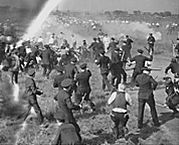--- THE GLOBAL AUCTION (Oxford University Press 2011, page 97
http://en.wikipedia.org/wiki/File:Ladies_tailors_strikers.jpg
The Knowledge Workers' Strike
This fictional case study considers how much influence employee unions can exert on companies’ decisions in today’s down economy. Traditionally, just three experts are invited to comment on the case. In this interactive version, HBR invites you to contribute your own solution.
Adapted from “The Knowledge Workers' Strike”, the July-August 2009 Harvard Business Review case study by Jon Healey.Congress of Industrial Organizations
Union presidents, including John L. Lewis of the United Mine Workers, founded the Committee for Industrial Organization in November 1935. Fed up with the refusal of the American Federation of Labor (AFL) to organize unskilled and semiskilled factory workers, Lewis and his allies provided the money and organizational framework for their mobilization and unionization. The committee formalized its break with the AFL when it held its first convention in 1938, renaming itself the Congress of Industrial Organizations (CIO).
 |

No comments:
Post a Comment